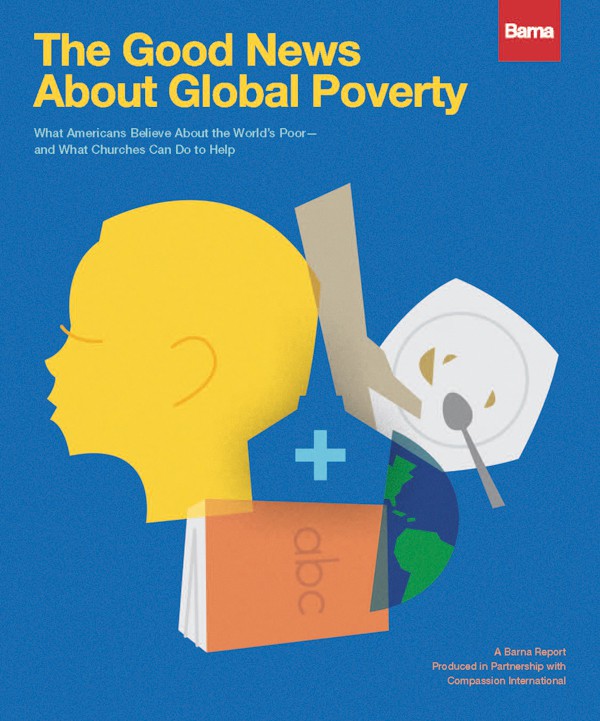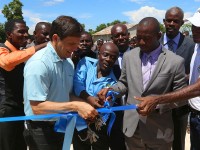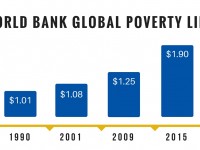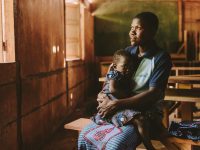At Compassion, we strive to fulfill the God-given mission of the global Church to care for the impoverished. We know that pastors and their churches desire to develop disciples who deeply engage in caring for “the least of these.”
This is why we are excited to announce a new research project we commissioned with the Barna Group entitled The Good News About Global Poverty: What Americans Believe About the World’s Poor — and What Churches Can Do to Help.

The report, based on surveys Barna conducted of the U.S. public and pastors, is an extensive study of Americans’ understanding of anti-poverty work, from their priorities and suggested solutions to their giving and volunteering habits. The research also examines how pastors and practicing Christians embrace a biblical calling to care for those in poverty in their programs, sermons and daily lives.
We learn through Barna’s data that while extreme poverty has been on a strong and steady decline for decades, very few people in the United States, including Christians, are aware of that. There is GOOD NEWS but we have not yet embraced it.
However, the results of the surveys also point toward the power of empathy and optimism. The research speaks clearly: U.S. churches have a unique opportunity to engage those who care most deeply about facilitating justice for the poor and who are equipped to make a difference.
After all, even though fewer people than ever before live on less than $1.90 a day, 385 million children are suffering under the spiritual, emotional, economic and physical weight of extreme poverty.
“Practicing Christians are the most engaged segment of the population when it comes to fighting poverty,” says Roxanne Stone, editor in chief of Barna. “Local churches are already doing many things right in discipling Christians toward compassion for the poor. But there is more to do: Fighting poverty — both material and spiritual — will always be the mission of the Church. We pray this report — both the data and the stories — will be an encouragement and a spark as you press into this mission.”
Jimmy Mellado, President and CEO of Compassion, and David Kinnaman, President of Barna, sat down and discussed some of the recent findings from our research partnership. In their conversation, Kinnaman posed the question, “What are some of the things that you think will be the preferable future for the way the church engages with global poverty? Are there some trends on the horizon?”
“There’s this rise of church-to-church relationship,” Jimmy said. “Where churches in the well-resourced world and churches in the under-resourced world are building these long-term relationships where … they start to regard themselves as one church. Through the [Compassion] sponsorship mechanism, we can connect congregations relationally. Family to family, child to child. We can help them build a relationship and then institutionally, the church can invest their institutional mission dollars on top of the relational capital that’s been built between the congregations and invest in the needs of the community in a systemic way that’s responsible. It’s long term, it’s developmental and it doesn’t create inappropriate dependencies.“
This engaging and comprehensive report presents:
- Infographics detailing Americans’ — and particularly Christians’ — responses to poverty
- Analysis of how demographics, faith, ideology and even emotions influence participation
- An introduction to the Poverty Action Types, classifying various approaches to support
- Expert interviews and practical tips for applying the data
Along with analysis of the data from the surveys, the report includes practical tools and inspiration for faith leaders to engage the hearts of their church communities in new ways.
Local churches in the poverty-stricken corners of our world often lack the resources by which to care for needs of their own communities. It’s our desire that this research will be a tool for uniting the global Church across the world in the fight against poverty.
“We believe that Jesus and His Church are and always will be God’s ‘Plan A’ to reveal His love to a world that desperately needs it. This is why we are excited to place this resource in your hands and pray you will be moved with compassion and inspired to even greater action as you review the findings, infographics and interviews.” — Jimmy







1 Comment |Add a comment
The first word, thinking about today’s pastors is… Strategic!!! i loved that